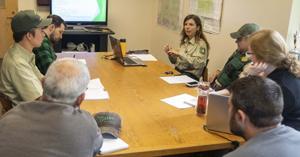The U.S. Department of Agriculture (USDA) has ignited controversy with a sweeping proposal to dismantle and relocate key U.S. Forest Service operations, specifically targeting the Pacific Northwest’s vital offices in Portland, Oregon. This audacious plan directly impacts crucial wildfire prevention, scientific research, and forest management capabilities, stirring significant concern among regional stakeholders and political leaders.
Under the new directive, the century-old Pacific Northwest Research Station in Portland, alongside the Region 6 headquarters, faces closure and consolidation. These facilities, integral to the health and sustainability of the region’s vast natural resources, are slated to have their functions absorbed by a network of newly designated “hub locations” across the country.
The agency’s restructuring blueprint, outlined in a July 24 memo by USDA head Brooke Rollins, envisions centralizing operations into five primary hubs: Fort Collins, Colorado; Indianapolis; Kansas City, Missouri; Raleigh, North Carolina; and Salt Lake City. The USDA asserts that these strategic moves aim to leverage existing concentrations of federal employees, reduce operating costs, and foster closer proximity to the populations they serve, though the fate of the hundreds of U.S. Forest Service employees in Portland, Oregon remains uncertain.
The announcement has sparked immediate and fervent opposition, with Oregon’s senior U.S. Senator Ron Wyden, a Democrat, publicly denouncing the initiative as “inane.” Senator Wyden articulated grave concerns regarding the geographic disconnect, arguing that relocating critical Pacific Northwest Forestry operations hundreds of miles away from their primary service area will inevitably hinder responsiveness to local needs and negatively impact the regional development of rural Oregon.
Despite the uproar, the Oregon Department of Forestry has expressed a more tempered outlook. While acknowledging the potential inconvenience of not having the regional office physically present in Portland, a spokesperson noted that modern virtual communication tools significantly mitigate the reliance on physical proximity for effective coordination and collaboration between state and federal agencies on shared objectives like wildfire management.
Conversely, academic leaders voiced substantial apprehension regarding the federal relocation plans. Tom DeLuca, Dean of Oregon State University’s College of Forestry, highlighted the established collaborative research projects between his students and the now-threatened Forest Service staff. He warned that dissolving these local ties would likely complicate future partnerships, escalate research costs, and diminish essential technical support for forestry management professionals throughout the Northwest.
DeLuca further emphasized the critical role these local offices play in providing ongoing research and monitoring, vital for improving forest ecosystems, studying pest outbreaks, boosting timber production, and adapting to a changing climate. The proposed move, he argued, risks disrupting a long-standing system designed to directly serve the region’s unique ecological and economic requirements.
Ultimately, critics like Dean DeLuca perceive this decision as a prime example of a top-down, D.C.-centric approach, superficially disguised as a benefit to local communities and agricultural stakeholders. He contends that the USDA Policy shift, rather than meeting the specific demands of Pacific Northwest foresters and farmers, instead removes essential resources from the very heart of the forest management operations.






Leave a Reply